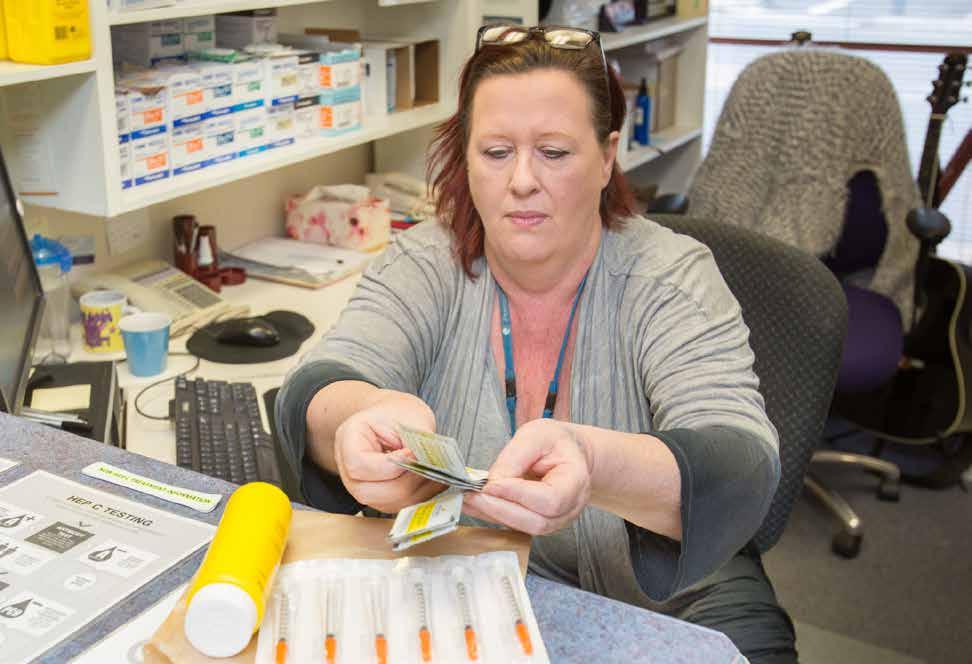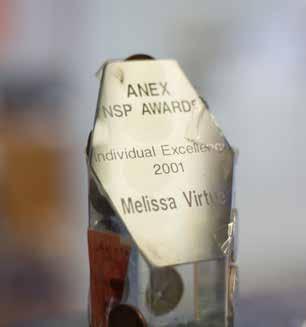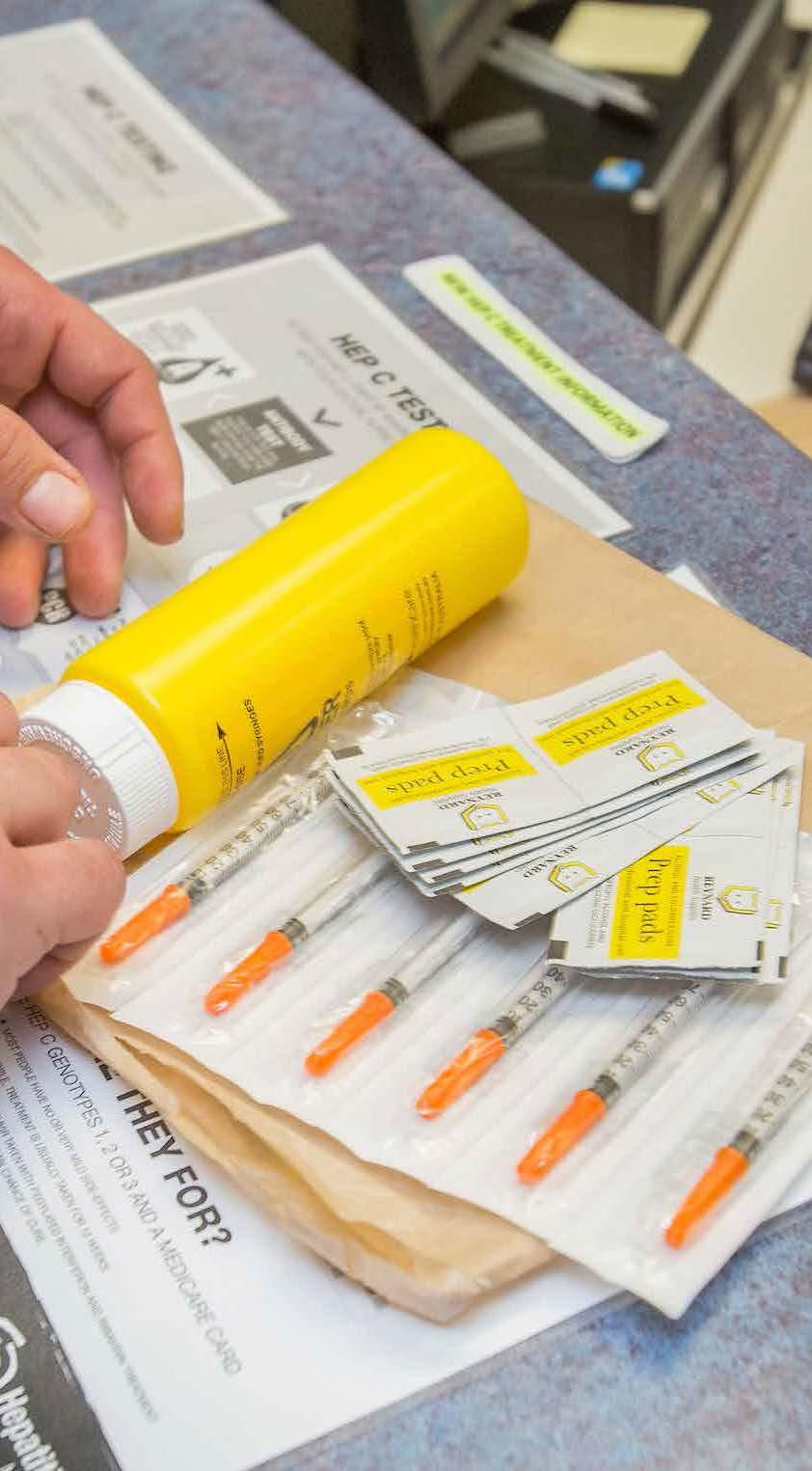
5 minute read
BOUNDARIES AND COLLEAGUE SUPPORT CAN EASE STRESS






Melissa Virtue and Sean Swift have seen a lot during their many years working at SHARPs, the busy NSP in the outer Melbourne suburb of Frankston.

Melissa is a Community Development Worker and began frontline NSP work 30 years ago in Collingwood – another of the most active and stressful areas in Victoria’s illicit drug scene. During her career she has seen many workers and clients come and go, and has learned to have some clear boundaries to help stay resilient against the stresses and traumas of the job. “The way we choose workers here is not on aptitude but attitude,” she says. “You have to be a certain type of person to work in the field. One, hopefully not a lot shocks you; two, you need to be non-judgmental, and, three, you don’t take it on board too much.

“I’ve been doing this for 30 years and I have seen people come and go; not so much through burnout but I have seen the job affect people. When I am here my full attention is directed to the client group and what they need.” Referring to herself, Melissa says “I am really big on self-care and at 5 o’clock, that’s it: for my own self-preservation I have to leave it here,” she says. “When we get new workers, I talk about the symbol of 5 o’clock – to make sure you are nurturing yourself.” Melissa has twice accessed the Employee Assistance Program to talk to a counsellor.



“Just to get it off my chest,” she says. “And talking with your co-workers and having a sense of humour also really helps. We really talk everything out and try and find solutions and get support from other community organisations. Most of the stress is around not being able to assist a client further because there aren’t enough services.” Melissa says that during her career “a little has improved and a lot hasn’t” as far as assisting clients goes. Back in 2012, Melissa and her colleagues in Frankston were among the first NSP staff in metropolitan Melbourne to notice ice emerging as a crisis. “Homelessness is a lot worse and ice is a big game-changer as far as the damage, physically and psychologically, it is having on our client group” On the positive side, “there’s a lot more acceptance [of NSP work] compared to when we started. People seem to have a better understanding of harm reduction.” Sean Swift, the SHARPS NSP team leader, says colleagues are often the only ones who understand how their challenging field can take a toll. The cumulative effects can be debilitating for some.




BOUNDARIES AND COLLEAGUE SUPPORT CAN EASE STRESS
Continued from page 3

When Sean started in NSP work 20 years ago, he remembers a particular group making use of the service, during a period when high-grade heroin was flooding the market.
“We called them the skateboarders because they were so young,” he says. Many went from being “really pleasant young people” to death, prison or hardened criminal activity. “The longer you work in this field, the death toll mounts up. And you probably have more regular contact with these people than most of their acquaintances – parents, family and friends.” Clients’ mental and physical health issues and loss of connection with their communities are also steadily observed by NSP workers. While frontliners might take a non-judgmental approach, “as a society we point our fingers at these people and say they are horrible people, drug addicts, scum of the earth”, Sean says. “I think there is a real lack of understanding and even of motivation to understand the death of drug users. It is difficult to accept. There are very few people you can talk to about it. Generally, the public has a really conditioned response to hearing about the death of drug users; no one seems to really care apart from those working in the field. They are the ones you can talk to.” Melissa says the compassion of an NSP worker is crucial, “where we are working with them as people, not as drug users – everyday people wanting to get on with their lives, which is what they are.” Sean says there are often – in the cities at least – private sector counsellors who are experienced with addiction and they could be sought out by workers rather than generalist counsellors.
– Andrew Stephens
n Regular debriefing with colleagues can give you a fresh perspective on troubling questions before they spiral out of control.

n Upskill in effective communication techniques, conflict resolution, de-escalation and negotiation to deal with difficult situations.
n Get educated on occupational health and safety. This may mean regular debriefing and supervision. n Employee Assistance
Programs can be accessed by asking a supervisor for help. The
EAP will usually offer four or five sessions.
n Your GP can refer you to a psychologist and prepare a mental health plan. Medicare rebates of varying amounts apply for different sorts of counselling. Oneon-one sessions with a psychologist are subject to a $150 rebate. n Get supervision to help you develop your skills and learn how to cope. n Take your scheduled breaks. Working through may make you look conscientious, but at what emotional cost to yourself? n Try to exercise regularly.
It’s good for your mind and body. n Learn to manage negative thoughts. n Set boundaries between your work and personal time to improve work/ life balance.
n Stay connected with friends and family out of work hours.
Isolation is very bad for mental health.




